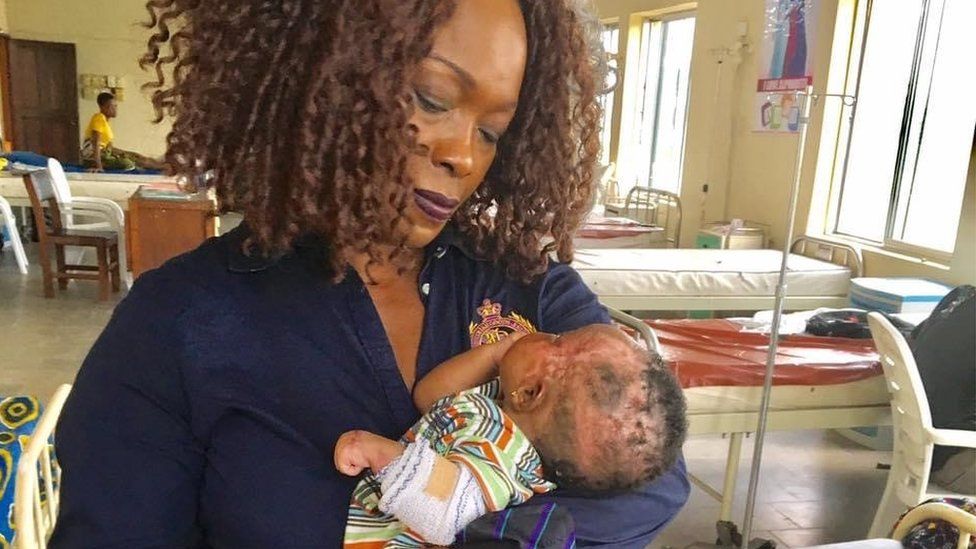Ordinary people doing extraordinary things!
U.S.-based Nigerian activist Iby Ikotidem is Founder Hope Door Foundation (HDF), a non-profit dedicated to advocacy for people affected with leprosy in Nigeria. Through her foundation, she strives to provide underprivileged children with necessities to improve their lives, one child at a time via paying medical bills, provision of school supplies as well as basic necessities to the people affected by leprosy. She also stretches her impact, rebuilding the lives of internally displaced persons, rehabilitating and integrating, and empowering them to thrive in an enabled society.
The journey:
Over a decade ago, Ikotidem was living her happily ever after in New Jersey; a thriving real estate business, an active social life, and love for everything fashion, but it all changed.
“I was a showstopper,” she recalls. But with the appearance of the first patch of dry skin on her knee, just around the time her real estate business folded, life as she knew it turned 180 degrees. Although at first, she brushed it away, but with the rapid spread all over her body, except her face, she knew something was seriously wrong.
A series of tests were conducted and Ikotidem was diagnosed with acute psoriasis, an autoimmune skin disease with no cure that causes red, itchy scaly patches, most commonly on the knees, elbows, trunk, and scalp.
Love for self varnished, the mirror became the enemy and she began putting extra effort to hide under long-sleeve blouses and maxi skirts, that did little to aid her plight, stigmatization followed everywhere she went. Sometimes when she got up from a chair, people exclaimed in shock, wondering where the “dust” on the floor had suddenly appeared from.
“I hated looking at myself. The mirror was my enemy,” she tells BBC.
A particular incident occurred which scarred her; she had honored a call to spend the weekend partying in her friend’s house along with other guests, while everyone retired to guest bedrooms upstairs, she was given a mattress on the floor in the basement.
“I sat on the floor, crying,” she recalls the pain all too clearly. From there, her whole life took a major dip, she became a recluse, shaved her hair and continued on a downward spiral, and even became suicidal until an intervention from her 12-year-old daughter told her: “Mummy, you’re my hero. Please, don’t allow this sickness take you down.'”
“That dissolved every thought of suicide I had.” She recalls. A year after her diagnosis, she had delved into charity work, teaming up with younger folks from her home state Akwa Ibom to do charity work there, their dedication was covered by national television. Later on upon being asked, she decided to accompany an old schoolmate who had suggested they extend their charity to leprosy colonies in the state. She was in total disbelief, hearing leprosy still existed was a shocker.
The visit to the leprosy centers stirred something within her. She knew what it was like to be stigmatized like some who even after being healed cannot return to normal life.
“I knew what it was to be abandoned, to be stared at,” she said.
Over the past decade, Mrs. Ikotidem has made caring for leprosy patients her calling. Today, Iby Ikotidem has found her life’s mission and healing, breaking the cycle of stigmatization and restoring hope through her HDF foundation, which operates in southern and northern Nigeria.
Among other assistance, she provides them with special shoes, crutches, and wheelchairs. She supplies their children with stationery for school. She renovates their residential areas.
“You need to see some of the mattresses they used, you wouldn’t even let your dog sleep on it,” she said.
Without adequate from the government, leprosy colonies in Nigeria have been forced to depend mostly on international charities, such as The Leprosy Mission, this is what drives her more.
“When they have any problem, they call me, not the government,” Mrs. Ikotidem said, who funded her initial projects by selling her precious jewelry before hosting fundraising events and reaching out to friends.
“I go to bed thinking about this community and wake up thinking about them,” Mrs. Ikotidem said.
“In psoriasis, I found my mission, and in my mission, I found my healing.”



